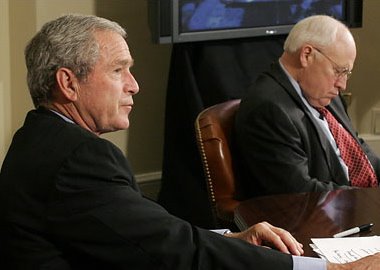[Sorry I've been out of pocket, Little Miss Mother-in-Law came to visit!]
Personally, I've never heard of David Halberstam. And according to him, that's a good thing:
By and large, the more famous you are, the less of a journalist you are.He was apparently a well-respected journalist, and his death has reopened a debate -- as people sing his praises-- as to what exactly the role of the journalist is.
Look at this brief comparison Salon's Glenn Greenwald points out. Halberstam is describing a press briefing during the Vietnam War in which he stood up to a room full of intimidating generals.
Halberstam: And I stood up, my heart beating wildly -- and told him [we won't be intimidated]... Never let them intimidate you. Never. If someone tries, do me a favor and work just a little harder on your story. Do two or three more interviews. Make your story a little better.In other words, as Helen Thomas has been saying far more delicately than this, grow a pair.
Elizabeth Bumiller of the The New York Times (about press briefings in the runup to the Iraq War): ...in the East Room press conference, it's live. It's very intense. It's frightening to stand up there. I mean, think about it. You are standing up on prime time live television, asking the president of the United States a question when the country is about to go to war.
Related to this is the concept of "access", which is to say, "If I write unflattering things about them, they won't talk to me anymore." Which sounds childish, but then, if a journalist doesn't have anyone to interview, he's an opinion columnist. (Ahem.) So the fear isn't just about standing up on TV, it's also about risking your career, which is pretty scary. (Again I say, grow a pair. Or quit and housesit cats, which is apparently all the excitement you can handle.)
However, I'm not sure that's the whole story. I've mentioned before that the media, particularly TV news, had the technology to create very splashy graphics, "The Situation Room", satellite feeds, etc., etc.-- and the time to get it all in place because the runup to the war gave it to them. They weren't asking the Big Questions because they were asking, "Can we make that banner a little redder, you know, like war?" They had to accept the inevitability of the war because that's what gave them the preparation time.
But something else has happened too, and when you read all this debate on journalism in this news cycle because of Halberstam's death, look for people talking about it.
Somewhere along the line, the media seemed to take the tack that they were there to record everyone's sound bites. This has been called "the Fox effect", wherein the conservatives complain that their side hasn't been heard, and everyone rushes out to get an Opinion B for each Opinion A. For every scientist interviewed about the possible effects of global warming, for example, we have to quote someone who says that science hasn't figured out global warming, and this passes for "fairness" and "balance".
And this is done with no regard for investigating the truth, which is to say that the journalist no longer feels the need to determine which Opinion, if either, holds any water. Wolf Blitzer's job seems to have become, "Get the sound bite from Opinion A Guy, then get the sound bite from Opinion B Gal, and we've done our job," rather than, "We have two opinions here, let's do some digging and see which one withstands scrutiny," with the idea of helping the public make sense of these opinions.
Apparently journalists feel that if they did that, they would be exhibiting a "bias"-- if I dig around and find that Mr. Opinion A has solid research behind him, while Ms. Opinion B happens to be a political operative sent out to spew talking points but no actual expertise or research, and so I tell my audience to listen to Mr. Opinion A (or even just imply it), then I'm "taking Mr. A's side" and therefore am clearly biased and not to be listened to.
And yet this used to be the role of the news, and we still tend to rely on our news reports as if they actually perform this service for us.
Instead, we get,
JOURNALIST: "What is the White House response to claims that the sky is blue, Mr. Talking Points?"I should point out here that I'm not necessarily picking on Wolf Blitzer or any journalist in particular. This entire phenonmenon seems to reflect an actual shift in the mission of reporting, and to that end, these reporters are doing what the current millieu requires of them. Furthermore, if the new mission is merely to record talking points, then the overly splashy graphics and whatnot doesn't infringe on reporting, because once the talking points are quoted, there isn't much else to do. Asking "tough questions"-- that is, challenging the validity of assertions-- doesn't fit in this puzzle either, because all Wolf is required to do is record the Right and Left Opinions. He asks a question phrased to set up your talking point, you say it, and what else is there to ask you? You have your spin, you've said it, interview over.
Mr. TP: "Well, Mr. Journalist, I'm glad you asked. The WH believes that we are right and everyone else is wrong. Even without looking at it, I can tell you the sky is green, that just makes sense. People who tell you the sky is blue are biased against the Green Sky Initiative because of politics."
JOURNALIST: "Well, there you have it, folks. The White House says the sky is green. Now let's look at pretty graphics before we listen to the next registration of talking points-- I mean, debate."
Maybe this is a reflection of how sophisticated spin machines and campaigns have become. Maybe at some point the press corps just gave up trying to shake these operatives from their talking points. "No matter what I dig up," a reporter says, "they just stick to their story and spin my research away, so what's the point of asking them anything?" Which sounds lame, but really, if you were going to interview Cheney today, or the even more artful Rumsfeld a few months ago, would you expect either man to crack under your reporting and admit he's spinning? Would you expect to shake him off his talking points? And if you badgered him with questions that he spins away or refuses to answer, do you think you'll ever get to interview him again? It's like that saying about teaching a pig to sing*-- you won't get anywhere, and you'll annoy the pig, who will cancel all your interviews and take away your WH press credentials.
Whichever caused this, the chickenhawk or the egg, I can only imagine one way out. We must intentionally and in one mass movement shift the mission back to the principles we need so desperately in the Fourth Estate in order for it to inform us.
Perhaps a reporter breaks the Halberstam Law and gets famous by doing things the old school way-- for example, Anderson Cooper yelling at politicians during the aftermath of Katrina-- and in this way creates a new archetype of journalist that everyone strives to be. A better example than AC, who appears to have flashed in his pan already, might be the movie All the President's Men, which in its day inspired journalists to "bring down politicians" the way Woodward and Bernstein are portrayed as having done. In other words, we're holdin' out for a hero.
With or without him, though, what must follow is a fundamental, intentional shift in the mission. We must define what the New Journalism should be and create a Ten Commandments for it. The disintegration of the Fourth Estate into the Record Keeping Department happened not that slowly, but gradually over time. Redefining and reinvigorating the Fourth Estate cannot happen gradually and organically. It must happen intentionally and with the highest ethical standards.
This isn't the sort of thing you write your congressman about, or even the newspaper editor. My best advice is to a) spread the word amongst your people, so that they are aware of the shift that has happened, and b) write to journalism professors. Ask them to redefine journalism and set its path straight again, or suggest they assign this as papers or suggest it to their graduate students for their theses. We need academia to set out a new standard, because the commercial media is too busy making money to make principles. But if the principles are established and the public is crying out to have them implemented, they will follow us, because, after all, we have the money.
*BTW, I heard a new one recently: "like mud wrestling a pig-- you won't win, and the pig will love it." Actually, I think debating Rumsfeld probably fell more into this category, because he seemed to have a hell of a good time in his press conferences.





